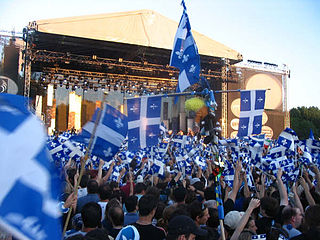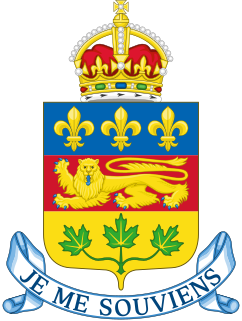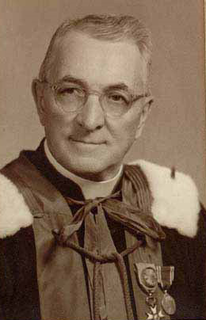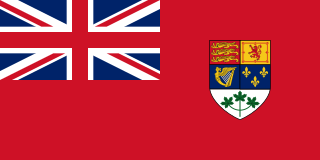La Survivance is an expression used by French Canadians denoting the phlegmatic survival of francophone culture, typically in the face of Canadian anglophone or Anglo-American hegemony. [1] It was used frequently in Quebec, especially before the Quiet Revolution of the 1960s, but also found expression among the culturally dispossessed francophone mill workers of northern New England, from the 19th century on. [2]
The culture of Canada embodies the artistic, culinary, literary, humour, musical, political and social elements that are representative of Canadians. Throughout Canada's history, its culture has been influenced by European culture and traditions, mostly by the British and French, and by its own indigenous cultures. Over time, elements of the cultures of Canada's immigrant populations have become incorporated to form a Canadian cultural mosaic. Certain segments of Canada's population have, to varying extents, also been influenced by American culture due to shared language, significant media penetration and geographic proximity.

The history of Canada covers the period from the arrival of the Paleo-Indians to North America thousands of years ago to the present day. Prior to European colonization, the lands encompassing present-day Canada were inhabited for millennia by Indigenous peoples, with distinct trade networks, spiritual beliefs, and styles of social organization. Some of these older civilizations had long faded by the time of the first European arrivals and have been discovered through archeological investigations.
Quebec French, also known as Québécois French, is the predominant variety of the French language spoken in Canada. It is the dominant language of the province of Quebec, used in everyday communication, in education, the media, and government.
The Parti Québécois is a sovereignist and social democratic provincial political party in Quebec, Canada. The PQ advocates national sovereignty for Quebec involving independence of the province of Quebec from Canada and establishing a sovereign state. The PQ has also promoted the possibility of maintaining a loose political and economic sovereignty-association between Quebec and Canada. The party traditionally has support from the labour movement, but unlike most other social democratic parties, its ties with organized labour are informal. Members and supporters of the PQ are nicknamed péquistes, a French word derived from the pronunciation of the party's initials in Quebec French.
French Canadians, or Franco-Canadians are an ethnic group who trace their ancestry to French colonists who settled in Canada beginning in the 17th century.

Nicole Brossard is a leading French-Canadian formalist poet and novelist. Her work is known for exploration of feminist themes and for challenging masculine-oriented language and points of view in French literature.

Quebec nationalism or Québécois nationalism is a feeling and a political doctrine that prioritizes cultural belonging to, the defence of the interests of, and the recognition of the political legitimacy of the Québécois nation. It has been a movement and a central issue in Quebec politics since the beginning of the 19th century. Québécois nationalism has seen several political, ideological and partisan variations and incarnations over the years.

Honoré Mercier was a Canadian lawyer, journalist and politician in Quebec. He was the ninth premier of Quebec from January 27, 1887 to December 21, 1891, as leader of the Parti National or Quebec Liberal Party (PLQ). He rose to power by mobilizing the Francophone opposition to the execution of Louis Riel, denouncing it as a betrayal by John A. Macdonald's Conservative government.

Quebec was first called Canada between 1534 and 1763. It was the most developed colony of New France as well as New France's centre, responsible for a variety of dependencies. Common themes in Quebec's early history as Canada include the fur trade -because it was the main industry- as well as the exploration of North America, war against the English, and alliances or war with Native American groups.

Canada is a country in North America. Its ten provinces and three territories extend from the Atlantic Ocean to the Pacific Ocean and northward into the Arctic Ocean, covering over 9.98 million square kilometres, making it the world's second-largest country by total area. Its southern and western border with the United States, stretching 8,891 kilometres (5,525 mi), is the world's longest binational land border. Canada's capital is Ottawa, and its three largest metropolitan areas are Toronto, Montreal, and Vancouver.

Post-Confederation Canada (1867–1914) is history of Canada from the formation of the Dominion to the outbreak of World War I in 1914. Canada had a population of 3.5 million, residing in the large expanse from Cape Breton to just beyond the Great Lakes, usually within a hundred miles or so of the Canada–United States border. One in three Canadians was French, and about 100,000 were aboriginal. It was a rural country composed of small farms. With a population of 115,000, Montreal was the largest city, followed by Toronto and Quebec at about 60,000. Pigs roamed the muddy streets of Ottawa, the small new national capital.
Canadian identity refers to the unique culture, characteristics and condition of being Canadian, as well as the many symbols and expressions that set Canada and Canadians apart from other peoples and cultures of the world. Primary influences on the Canadian identity trace back to the arrival, beginning in the early seventeenth century, of French settlers in Acadia and the St. Lawrence River Valley, and of English, Scottish and Irish settlers in Newfoundland and the Maritimes, the British conquest of New France in 1759, the migration of United Empire Loyalists to Upper Canada and New Brunswick, and the ensuing dominance of French and British culture in the gradual development of both an imperial and national identity.
Anti-Quebec sentiment is a form of prejudice which is expressed toward the government, culture, and/or the francophone people of Quebec. This prejudice must be distinguished from legitimate criticism of Quebec society or the Government of Quebec, though the question of what qualifies as legitimate crticism and mere prejudice is itself controversial. Some critics argue that allegations of Quebec bashing are sometimes used to deflect legitimate criticism of Quebec society, government, or public policies.
The French term pure laine, refers to Québécois people of French-Canadian ancestry, especially those descended from the original settlers of New France who arrived during the 17th and 18th centuries. Terms with a similar meaning include de souche and old stock as in "Old Stock Canadians".

Camille Roy was a Canadian priest and literary critic. He wrote extensively about the development of French-Canadian literature, and its importance in the promotion of French language and culture and of Christian ideals.
Quebecers or Quebeckers are people associated with Quebec. The term is most often used in reference to descendants of the French settlers in Quebec but it can also be used to describe people of any ethnicity who live in the province.
French-Canadian Americans are Americans of French-Canadian descent. About 2.1 million U.S. residents cited this ancestry in the 2010 U.S. Census; the majority of them speak French at home. Americans of French-Canadian descent are most heavily concentrated in New England, New York State, Louisiana and the Midwest. Their ancestors mostly arrived in the United States from Quebec between 1840 and 1930, though some families became established as early as the 17th and 18th centuries.

The historiography of Canada deals with the manner in which historians have depicted, analyzed, and debated the history of Canada. It also covers the popular memory of critical historical events, ideas and leaders, as well as the depiction of those events in museums, monuments, reenactments, pageants and historic sites.

Old Stock Canadians is a term referring to European Canadians whose family has lived in Canada for several generations. It is used by some to refer exclusively to anglophone Canadians with British immigrant ancestors, but it usually refers to either anglophone or francophone Canadians as parallel old stock groups. Francophone Canadians descended from early French immigrants in New France are sometimes referred to as Québécois pure laine, often translated as "dyed in the wool", but with the same connotation as old stock.
Operation McGill français was a large street demonstration in Montréal during the Quiet Revolution. Though comprising a range of trade unionists, Quebec nationalists, students and other leftists raising many different demands, the key objective for which the protest was called was for McGill University to become a French-speaking educational institution. The demonstration took place in Montreal on March 28, 1969 in the midst of Quebec's Quiet Revolution. On this day, approximately 10,000–15,000 protesters, gathered and walked down Sherbrooke street towards the Roddick Gates calling for McGill University to become francophone, along with pro-worker and nationalist demands. These protesters held signs that read slogans such as "McGill aux Québécois!" and "McGill aux travailleurs", which loosely translates to "McGill to Quebeckers" and "McGill to workers" respectively.